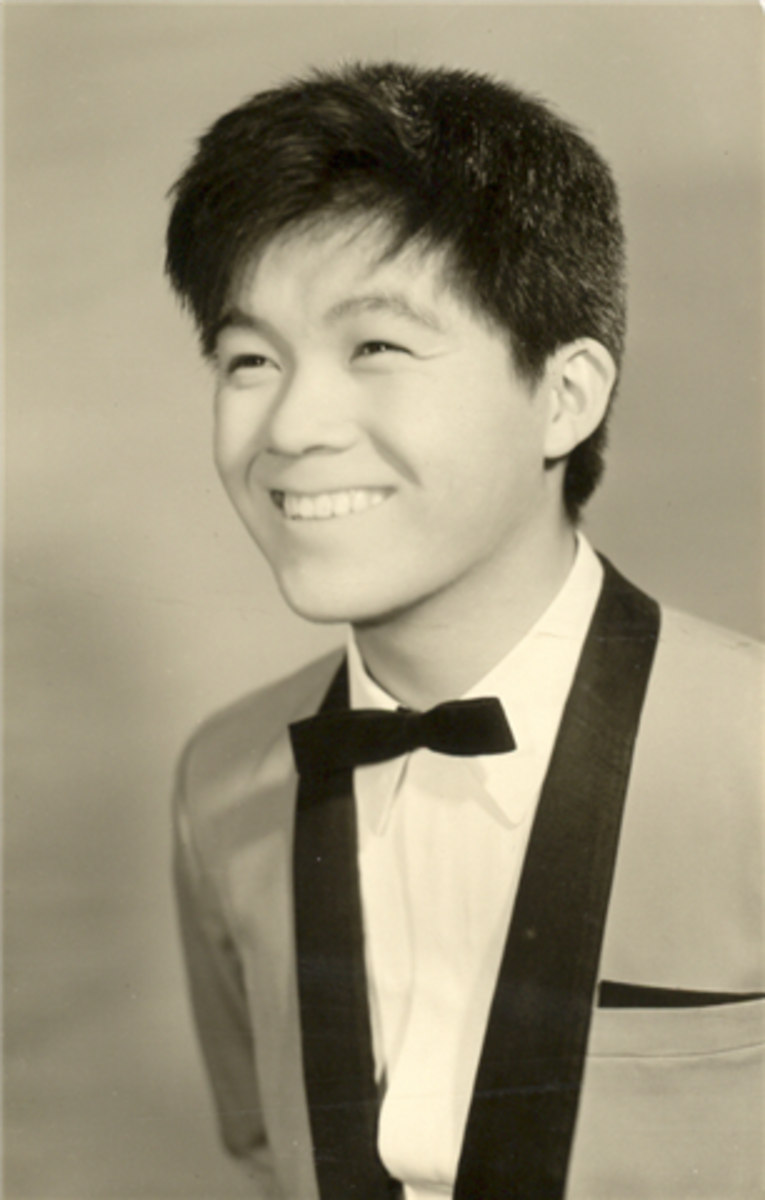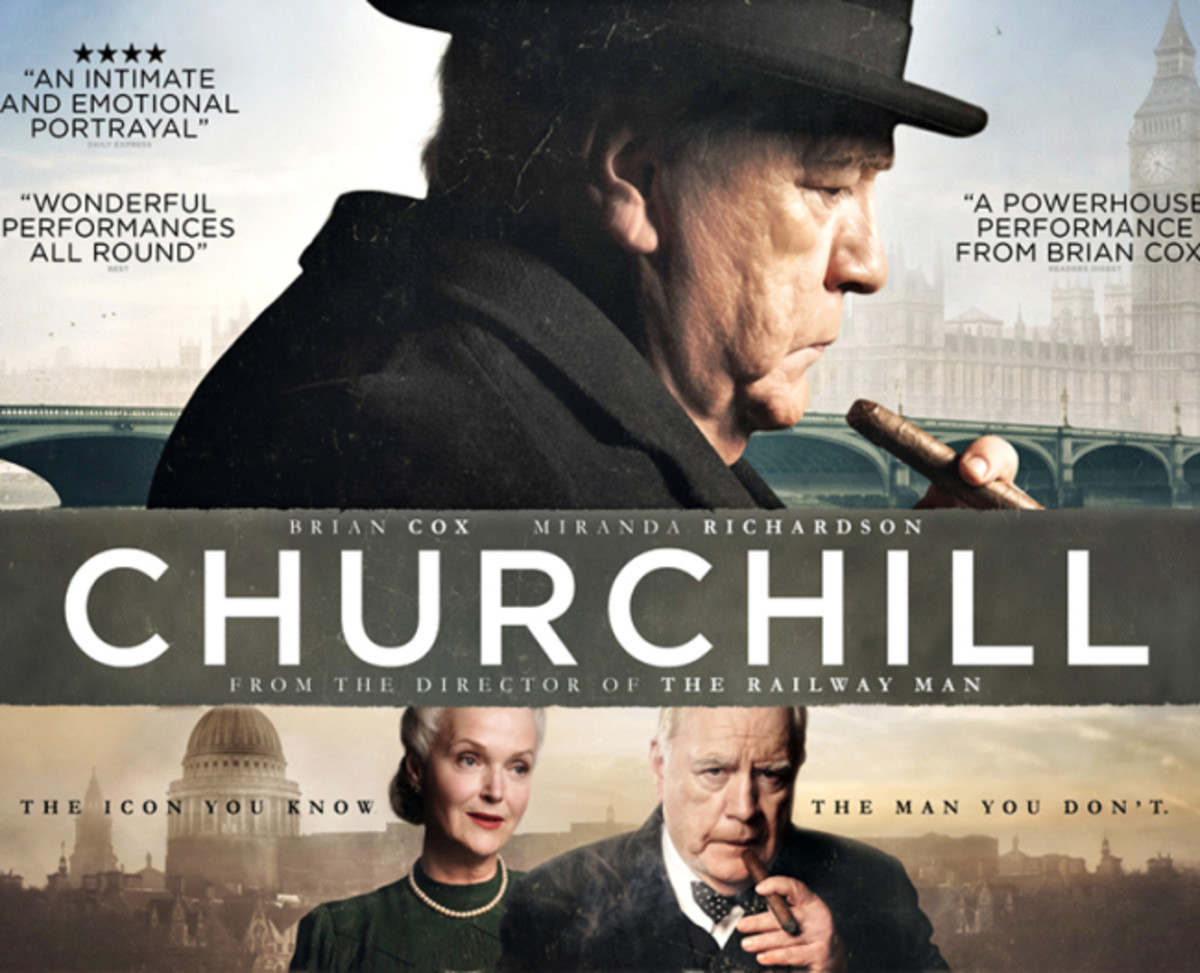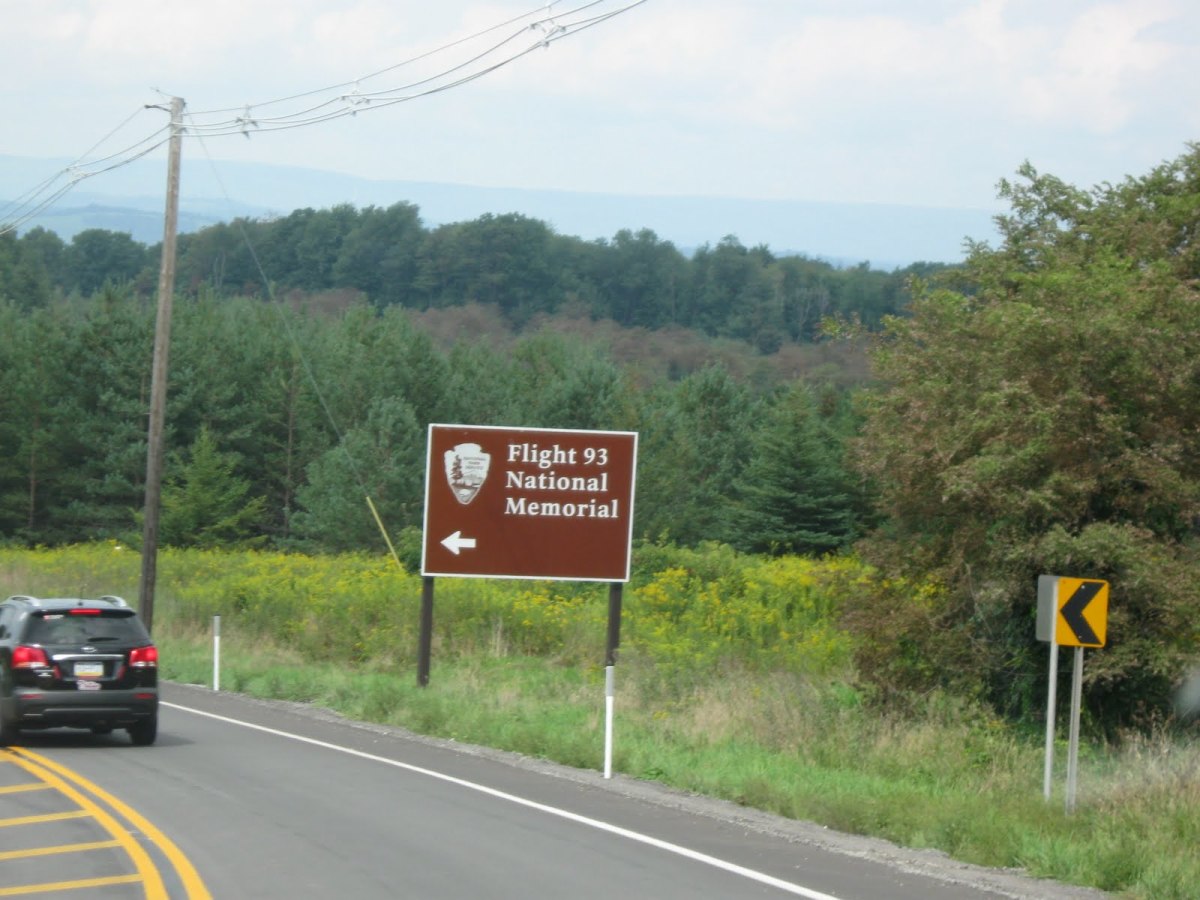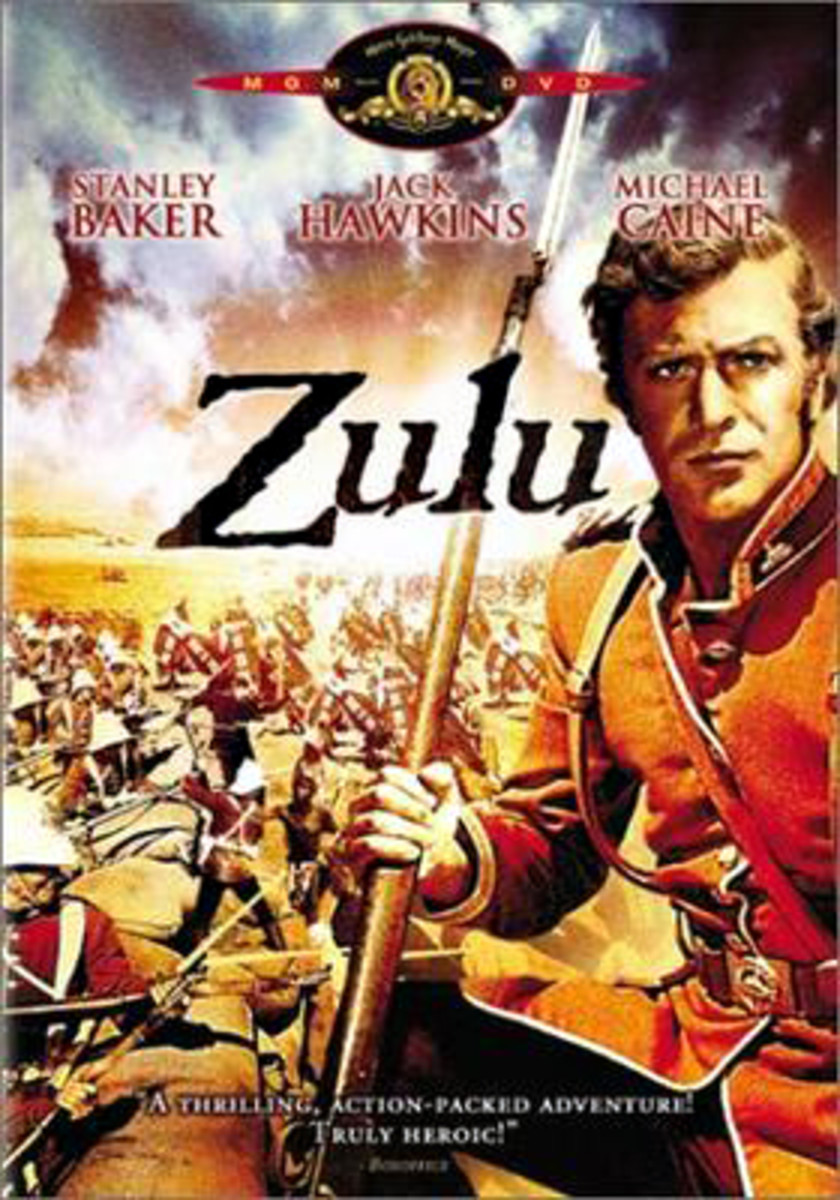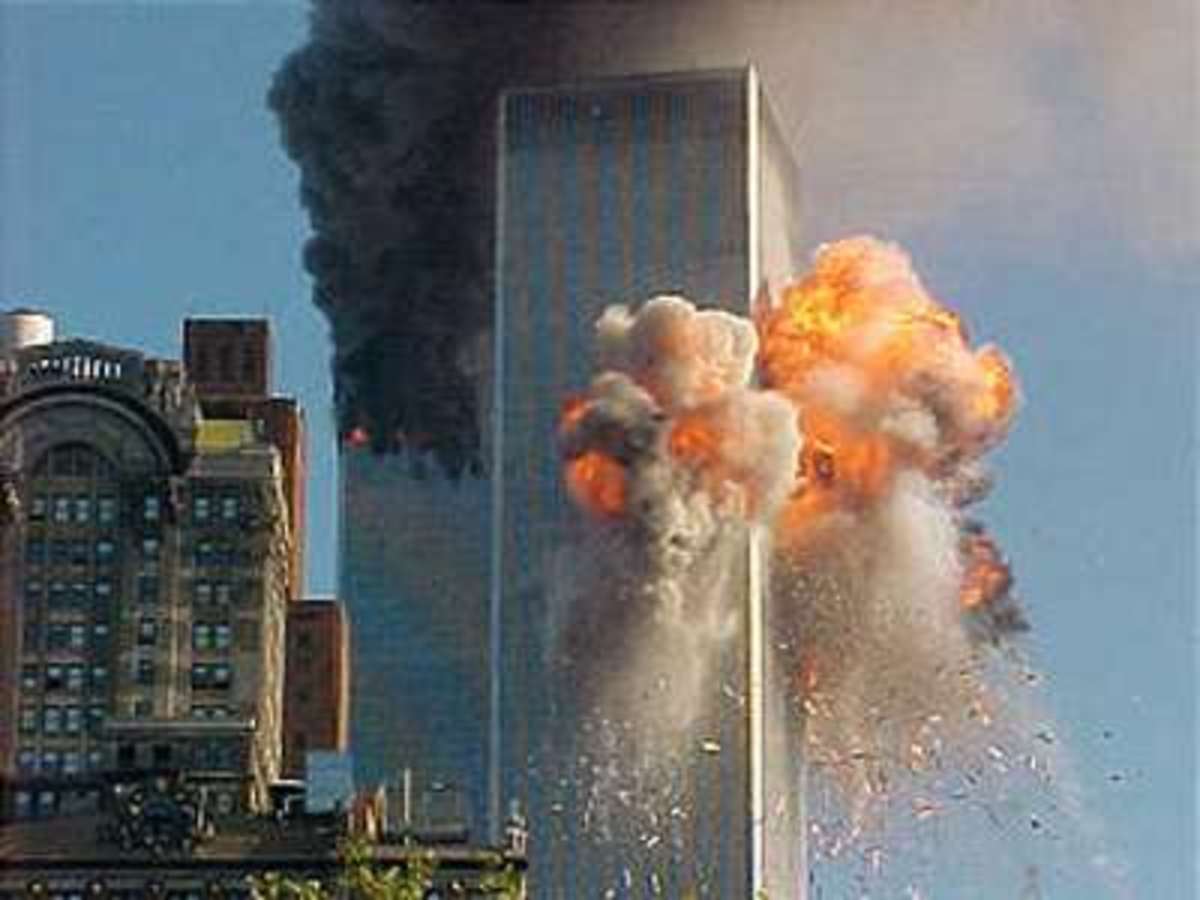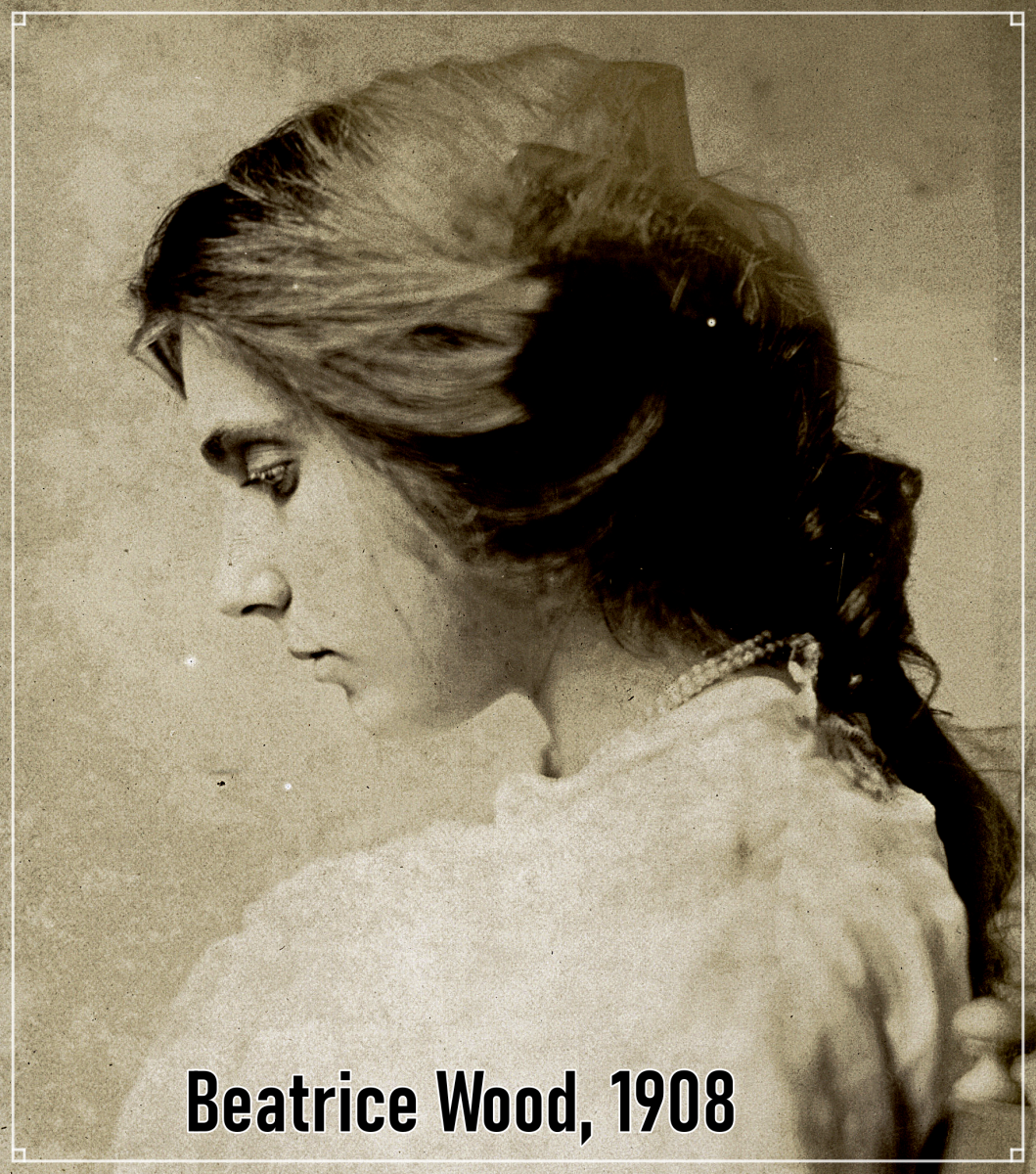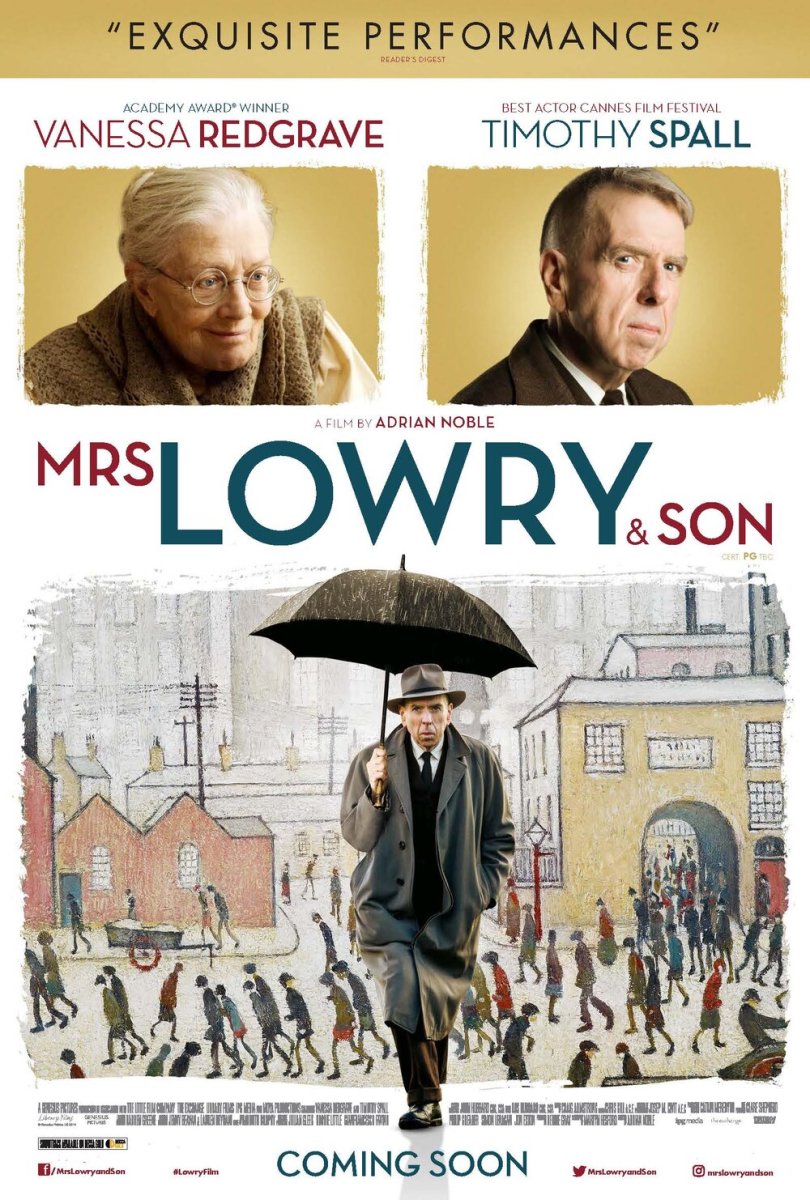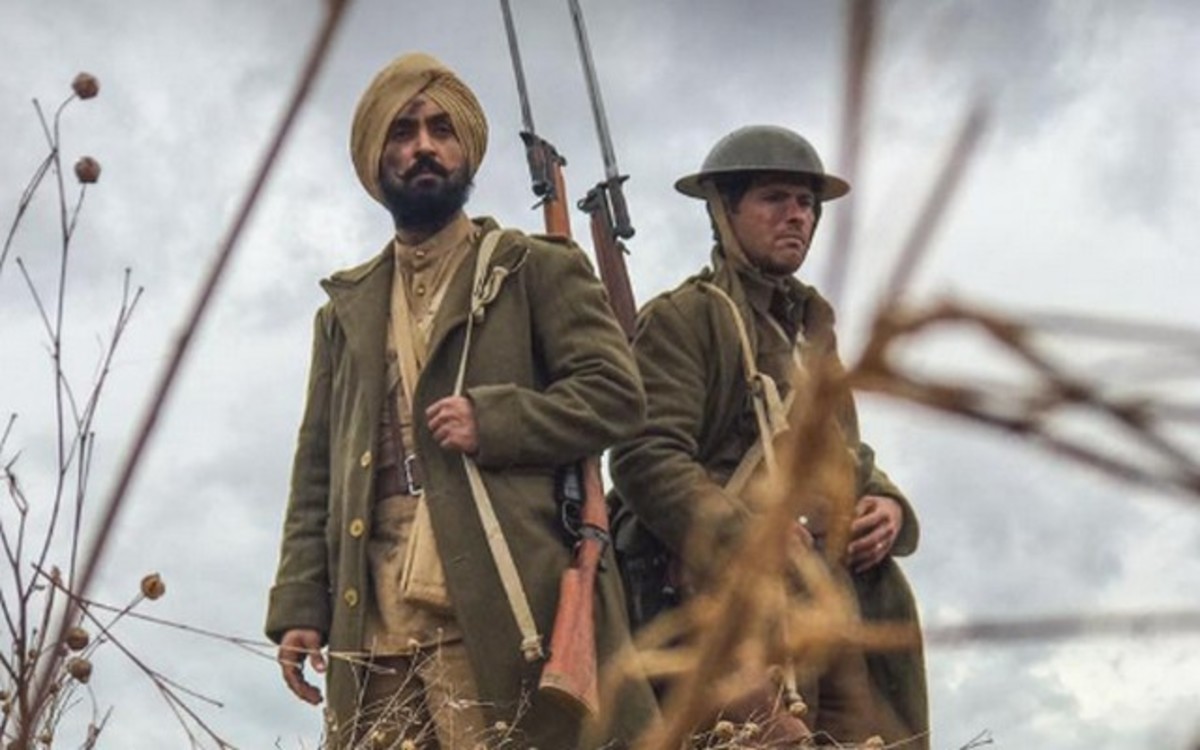Film Review - United 93 (2006)
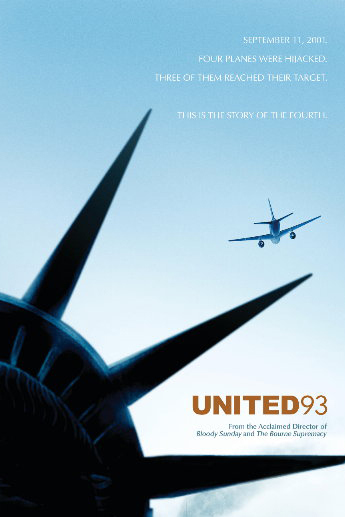

Introduction
On that fateful day in September 2001 when terrorists hijacked four airliners in America with the intention of flying them like explosive missiles into some of the nation’s most prestigious and important buildings in a grotesque suicide attack, so many remarkable stories unfolded in the actions of the innocent people affected by the attacks.
Mostly these concerned the people who were in the buildings, and the fire crews who risked life on the ground in New York and Washington. But there was one other remarkable story which involved the passengers and crew of one of the four airliners.
Two of the aircraft had already hit the twin towers of the World Trade Centre whilst another had hit the Pentagon. But the fourth plane was to suffer a different fate. On this plane several passengers were in communication with friends and loved ones who had been keeping them informed of the events happening elsewhere. On this plane the passengers knew that this was no ordinary hijacking. They fought back. This film is the story of United 93.

All of my fiilm reviews can be accessed at the following page
- 100 of the Greatest Movies in History - A Greensleeves Page
What makes a great film? Everyone will have their own views, but perhaps the only defining quality is quality itself. This, however, is my list of 100 of the greatest films ever made. The list also includes links to all my film reviews.

My Intentions
This page was written on 30th August 2011.
I am not qualified to discuss in detail the events of 9/11, though of course I do have my own views on the subject. I am, however, able to write a review on a movie, so this is what I chose to do on the occasion of the tenth anniversary of the atrocities.
This was not an easy review to write. Although I am not an American citizen, human life is the same the world over and I am well aware of the sensitivities of Americans on these issues.
As such I hope to have handled this review with some sensitivity. If I fail, it will be because of my inadequacies as a writer; it will not be due to any lack of respect or a lack of good intent.
My very best wishes to all with personal involvement in the events of 9/11.
The Format of This Review
My film reviews follow a format. I tend to keep the reviews free from too much technical detail, and I keep them light in tone. I always include sections devoted to favourite or key scenes and quotes, a section devoted to identifying great acting performances, and a section for trivial facts. But none of this seems to be very appropriate when writing about 'United 93'.
- How can you have a 'favourite scene' which you ‘enjoy’ more than any other in a movie so very close to a tragic reality?
- How can you have a 'favourite quote', when the script for this film is not written for dramatic or witty effect, but rather to reflect as accurately as possible the real life conversations of the ordinary people involved, on the ground, and up in the air?
- And how can you even talk about acting performances? The cast has no stars, no leads, no ‘characters’, just a very long list of actors doing their jobs without individual egos or any attempts at scene stealing. It would, in my opinion, be unfair to single any one of the hundreds of actors involved for special mention. All I will say about the acting is that each performance we see is restrained, credible, and respectful.
This page therefore follows a very different format to the norm for my film reviews. A simple account of the events of 9/11, and how the film 'United 93' tackled the task of portraying one of the most dramatic stories of that day in 2001.

The Events, As Depicted in 'United 93'. Events on the Ground
The film 'United 93' begins early on September 11th 2001 as four terrorists head for Newark International Airport after morning prayers to board the United Airlines flight chosen to be their weapon of destruction. But take-off of United 93 was delayed by about 41 minutes. And that fact was to have a crucial effect on the outcome of their mission.
Even before the plane took off there were intimations that another plane - American Airlines Flight 11 - had been hijacked, but nothing could be verified at this time, and there seemed no reason to ground all those aircraft about to get airborne.
What followed was a period of widespread confusion in air traffic control centres, as conflicting reports suggested that first one plane, and then a second, had been taken over. Flight 11 changed direction and contact was lost. Everyone reading this knows what happened next, but for the air traffic controllers, no certainties existed at this stage. Then the first images of the World Trade Centre on fire came through, and the second plane - United Airlines Flight 175 - began to descend towards the twin towers. Attempts to co-ordinate a response began, but communications with the U.S Airforce were confused and contingency plans to deal with situations like this were, perhaps understandably, ill-prepared. The airforce could not prevent a third plane - American Airlines Flight 77 - from crashing into the Pentagon Building, and it gradually became clear, albeit rather too late, that a fourth plane had also now been hijacked.

The Events, As Depicted in 'United 93'. Events in the Air
On United 93, the hijackers had made their move, and three burst into the cockpit to overpower the pilots, whilst the fourth stood guard with a bomb (now regarded as supposedly fake). At this time in 2001, hijackings had traditionally followed a pattern; armed terrorists would take over a plane, and force the pilots to fly it to a destination of their choice. On arrival, there would be hostage negotiations, at the end of which the hijackers might go free, or they might surrender. Sometimes negotiations might totally break down, the aircraft would be stormed, and some people - terrorists or civilians - might be killed. Whatever the outcome, the correct tactic for the innocent victims of hijackings was always to play ball with the terrorists for as long as they showed physical restraint, because that way there was a very good chance that most or all would walk away from the plane at the end of the ordeal.
The passengers and crew on Flights 11, 175 and 77 would have had no reason to suspect that these hijackings would be any different. They could not have suspected until too late that these particular hijackers were intent on a dramatic martyrdom, taking all they could with them. So they played ball. United 93 was different. The delay in take-off meant that with the benefit of modern in-flight communications including telephone links to the ground, the people on board became aware of the events at the World Trade Centre and the Pentagon. The awful truth dawned and they realised that there was no value in sitting tight and doing what the hijackers demanded of them. They had to take action to try to save themselves, and to save from destruction whatever target the terrorists had in mind.
The film ends with chaotic and ultimately tragic scenes as some of the passengers move towards the front of the plane. They overpower one of the terrorists, and they hammer on the cockpit door, attempting to break through to wrest back control of the plane. The terrorists are by now in a state of high anxiety as their plan falls apart. Their leader begins to turn the plane and United 93 enters a steep decline.

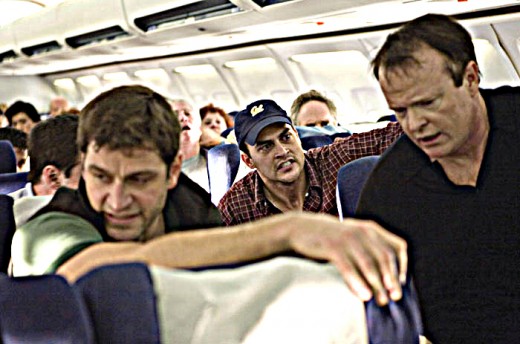

Heroes ?
The passengers and crew of United Airlines 93 are regarded as heroes by many in the States. Of course this film is about a real event, and one of the sadnesses of real life, as opposed to Hollywood fiction, is that we can never know for sure which of the passengers and crew were prime movers in this act of resistance; we can however guess at some of them, - passengers like Todd Beamer, Tom Burnett, Jeremy Glick and Mark Bingham - because of conversations they had in telephone calls to loved ones on the ground. It was Mr Beamer who used the famous 'Let's roll' quote. But was there just one motivating force behind the fight back? Or five? Or fifteen? Physically it would have been difficult for everyone to get involved in the narrow confines of an airliner's cabin, so maybe some just sat tight, while others showed outstanding courage. It seems strange that without this act of resistance one of the major icons of American statehood - the Capitol Building or the White House - might have been utterly destroyed, and many more citizens on the ground may have died, and yet we cannot know exactly who on board United 93 did what to thwart the terrorists’ plans, and save a great American institution from destruction.
In these circumstances, perhaps it is reasonable for Americans to just consider all on board as heroes.

Facts of the Film
DIRECTOR - Paul Greengrass
WRITER - Paul Greengrass
YEAR OF RELEASE - 2006
RUNNING TIME - 111 minutes
GENRE - Factual (Dramatised Documentary)
GUIDENCE - There is some graphic violence and swearing. But of course the main issue for guidence here is that the subject matter is a very disturbing real life event, which some would not wish to see in movie form
ACADEMY NOMINATIONS - Paul Greengrass (Director) / Clare Douglas, Richard Pearson, Christopher Rouse (Film Editing)

The Manner of the Film's Presentation
This film is unlike any other I have reviewed. Indeed it is unlike any other I have seen.
- Some films like 'Apollo 13' may be based on true life, and may feature people still alive today, but nobody died on Apollo 13, and therefore some dramatic licence can be allowed for entertainment value; the performances of the actors can be allowed to shine through.
- Some films, like 'Titanic' may feature disaster and the loss of real human life, but events are so far in the past that much of the intense personal poignancy has been lost and it seems legitimate to speculate about the characters and personalities of the real people involved, without creating offence or distress.
But 'United 93' was made just five years after 9/11, far too close to the tragedy of that day for any fundamental truth to be sacrificed for the sake of entertainment. For this reason, even though writer / director Paul Greengrass presented his film as a drama, he did so with a documentary-like attention to realistic detail.
No stars perform in this film, and a number of the real life people on the ground who were responsible for controlling the airways and unravelling just what exactly was happening that day, played themselves in the movie. Several of the other characters in the film, including members of the crew, were played by real life United Airlines employees. The relatives of several of the victims gave their blessing to the making of the film and contributed information to enhance the work's authenticity, though some notably refused (including the relatives of Christian Adams - see below).
Events on the flight are shown as close to real-time as possible, and the mundane detail of flight preparations by crew and passengers is shown meticulously, maybe to emphasise just how routine this flight was, and how conventional the passengers were. They were just ordinary people taking a flight - they could have been you and me. Paul Greengrass offers very little analysis, and makes every effort to conceal his own views on the politics of the situation and controversy over the responses of the relevant authorities. It was not the intention of the film to promote an opinionated version of events - merely to record events as accurately as could be surmised by the evidence.
Some speculation about the precise turn of events is inevitable, and some of the sequencing of events shown in the movie may have been contradicted by flight recorder evidence later made available. However, Greengrass did, it seems, set out with the intent to make this a genuine and sincere account of what happened, the ordeal of the passengers and crew, and the efforts they went to to stop the terrorists from carrying out their mission.

A Cynical Exploitation? an Uninspired Retelling of the Event? a Fitting Tribute to All Who Died?
It was inevitable as soon as somebody first decided to make a movie about the events of 9/11, that the project would be controversial. It couldn’t be anything else. The fact that thousands of innocent people died that day, including 40 on United 93, meant that the film would be sure to raise a few eyebrows, and I’m sure the initial reaction of many on hearing that the movie was in production, was that this was going to be Hollywood at its cynical, exploitative, money-grabbing worst, making a fast buck with indecent haste. Some still think that way, even after seeing the movie, though most do not. But even if the film was made with the best of intentions, there was a danger that in unsubtle hands, Rambo-like antics would have lent the whole thing the air of an all-action adventure story. That it never fell into this trap is a tribute to the director.
A more valid criticism may be precisely the opposite; that far from being sensational, action-packed entertainment making money out of a tragic event, 'United 93' proved to be a dreary, factual retelling of the hijack with no attempt to examine in depth the thoughts or emotions of either the terrorists or their victims. I can understand that criticism - the terrorists seem rather bland and superficial, while the characters and personalities of the passengers are left unexplored. Many are left anonymous - if this were fiction, and a typical Hollywood disaster movie, then one would not really care about the fate of individual characters, because they just aren’t fleshed out enough to make you care. You wouldn’t identify with them.
But of course, it never leaves our mind that this isn’t fiction and it isn't just a typical disaster movie. And so you do identify with the passengers and crew, and you do care, with a passion. The flatness of the characterisations is intentional and serves two purposes. Firstly, turning the movie into a conventional action story with a lot of stereotypical villains and heroes, would cheapen the truth. Secondly, because this is about real people who died tragically, it would be wrong to try to second guess too deeply the behaviours and states of minds of the passengers and crew.
This second point however, brings me to the most serious criticism I would make. One of the passengers' actions IS second-guessed. A German passenger, Christian Adams, is shown protesting almost to the end, that retalliatory action should not be taken against the hijackers; that it was best to just sit still and not antagonise them. It may well be the case that some passengers did think this - a not unreasonable attitude, though proven by events elsewhere to be misguided - but apparently there is no evidence whatsoever that Mr Adams took this view, and no evidence that he took no part in the fight back. If the film makers wanted to depict dissenting voices amongst the passengers, then they should have made such characters entirely anonymous and unidentifiable.
For all these criticisms, I do think the film makes a genuine and sincere attempt to tell this story in the most realistic yet respectful way that could be achieved so soon after the event. To answer my own title questions therefore:
- No, I don't think 'United 93' is cynical.
- Yes I do believe the film is fairly dispassionate about an intensely emotional event, but I believe this is done for the best possible reasons.
- Whether it is a fitting tribute or not is debateable. It’s not a film which seeks to eulogise individuals on board as if they are all-action heroes, or condemn the authorities in charge on the ground. The film doesn’t even attempt to caricature the terrorists as subhumans - instead the film just allows the facts to speak for themselves, and allows the reasoned judgment of the viewer to draw the only possible conclusions about the actions and motivations of everybody involved.
The film just tells the story of United 93 as it is, and that is the way it should be, I think.

Conclusions and Recommendations
This may be a movie with actors playing roles, but it is not an entertainment. I’m sure, however, no one involved would take offence at that comment. This film is not intended to be an entertainment. Nobody is going to watch it from start to finish and feel excited by the action. Nobody is going to be cheering on the good guys and celebrating at the end as though the outcome is about one side winning and the other side losing. Everybody loses - but then that is perhaps the inevitable reality and the tragedy of terrorism.
'United 93' makes for uncomfortable viewing, but I think everyone should view it at least once.

Some of My Other Factually Based Film Reviews.....
- Apollo 13
In 1970,the Apollo 13 moon mission developed a critical fault. This movie is the story of what mission control did to try to get the astronauts back safely, and how the astronauts coped with being stranded in outer space - Downfall
The last days of Adolf Hitler in his Berlin bunker at the end of World War Two, has been documented often in factual programmes. This film is the first serious movie by a German director to tackle this sensitive aspect of his country's history - Zulu
The film 'Zulu' relates the events of Rorke's Drift. It is a historical epic, the story of a heroic defence against seemingly impossible odds - a British 'Alamo' This is a review of the film

Please Provide Your Assessment of This Film
Link to My Other Pages


